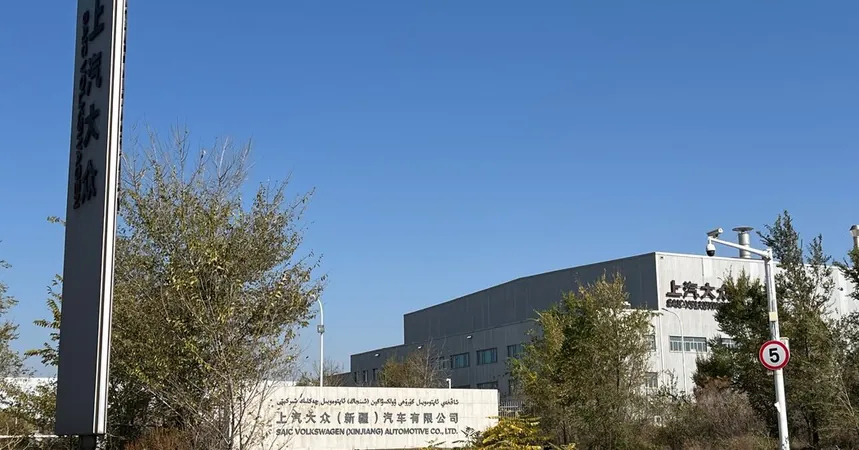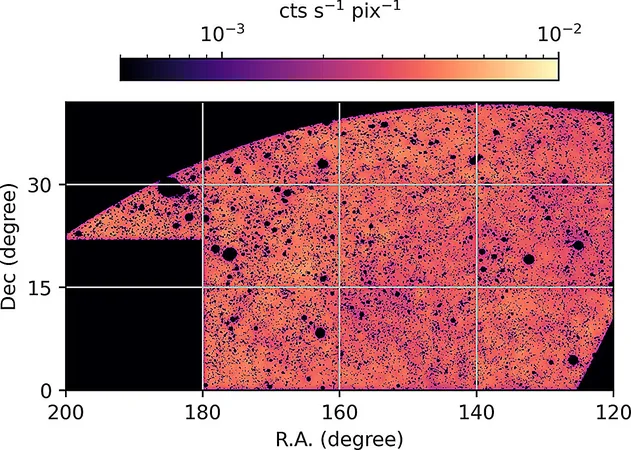
Volkswagen Exits Xinjiang: A Major Shift Amid Human Rights Concerns and Business Challenges
2024-11-27
Author: Ying
Volkswagen's Withdrawal from Xinjiang
In a bold move, Volkswagen has announced that it will completely divest its ownership stakes in its operations located in Xinjiang, China, an area notorious for its ongoing crackdown on predominantly Muslim ethnic populations. The decision comes after 12 years of presence in the region, where Volkswagen maintained a joint venture assembly plant in Urumqi, Xinjiang's capital, along with two test tracks—making it the most prominent multinational company in the area.
Human Rights Concerns
This long-time investment has drawn significant scrutiny from human rights organizations, particularly in light of allegations regarding forced labor practices affecting Uyghurs and other ethnic groups in Xinjiang. The pressures from human rights groups have not gone unnoticed; both the United States and an increasing number of European nations have placed restrictions on imports from Xinjiang, citing evidence of systemic human rights abuses.
Chinese Government's Stance
The Chinese government has vehemently denied these claims. In a recent display of its rigidity, the Ministry of Commerce launched an investigation into PVH Corp—the parent company of Calvin Klein and Tommy Hilfiger—accusing it of taking "discriminatory measures" by halting purchases from Xinjiang manufacturers.
Economic Viability Issues
Volkswagen's Urumqi assembly plant, originally intended for gasoline-powered vehicles, has turned into a financial burden for the company. As China rapidly pivots to electric vehicles (EVs)—with half of all cars sold this year being either battery-electric or plug-in hybrids—the need for traditional combustion-engine factories has sharply declined. Compounding the issue, the Urumqi plant has been inactive since 2019, with no signs of operations returning.
Competition from Domestic Automakers
In recent years, Volkswagen has found itself in fierce competition from Chinese automakers, particularly BYD, which has overtaken the German giant in domestic sales. The Urumqi plant's operations were not just politically fraught but economically unviable, facing a significant logistical challenge due to its location—1,800 miles from the coast, limiting potential exports to nearby Central Asian markets.
Current Operations and Future Plans
Currently, Volkswagen collaborates with its state-owned joint venture partner, SAIC Motor, employing only 175 workers for final preparations of cars destined for dealerships in western China. Both companies have considerable stakes riding on their cooperative ventures, with Volkswagen planning to introduce at least eight new electric models in the coming years.
Background of the Urumqi Plant
The assembly plant in Xinjiang was established between 2012 and 2013 to cater to less expensive vehicle markets in western China. As part of its strategy, Volkswagen had initially prioritized hiring Uyghurs in an attempt to create an inclusive workplace; however, reports of systemic discrimination against this ethnic group are deeply troubling. The situation escalated significantly in 2014, as the Chinese government enforced stringent measures against Uyghurs, leading to claims of up to a million ethnic minorities being detained and subjected to forced labor.
International Scrutiny
Despite Volkswagen’s assurances against using forced labor, scrutiny intensified, particularly after an audit of international labor practices in the region raised concerns about worker anonymity. Following extensive discussions since February about potential changes to its Xinjiang operations, Volkswagen's hand was ultimately forced by dwindling sales of gasoline-powered vehicles and increasing international scrutiny.
Changing Government Pressure
China's foreign ministry, which previously urged Volkswagen and other corporations to maintain their investments in Xinjiang, has begun to shift its tone as international pressures mounted. Nonetheless, the backdrop of this corporate exit is a stark reminder of the ongoing human rights crisis in Xinjiang and the complexities faced by businesses operating in such contentious environments.
Conclusion
As Volkswagen reorients itself towards a greener future, the decisions made in Xinjiang underscore the critical interplay between corporate strategy and global human rights standards. The question remains: how will other multinational corporations respond in the wake of such a significant exit?



 Brasil (PT)
Brasil (PT)
 Canada (EN)
Canada (EN)
 Chile (ES)
Chile (ES)
 España (ES)
España (ES)
 France (FR)
France (FR)
 Hong Kong (EN)
Hong Kong (EN)
 Italia (IT)
Italia (IT)
 日本 (JA)
日本 (JA)
 Magyarország (HU)
Magyarország (HU)
 Norge (NO)
Norge (NO)
 Polska (PL)
Polska (PL)
 Schweiz (DE)
Schweiz (DE)
 Singapore (EN)
Singapore (EN)
 Sverige (SV)
Sverige (SV)
 Suomi (FI)
Suomi (FI)
 Türkiye (TR)
Türkiye (TR)